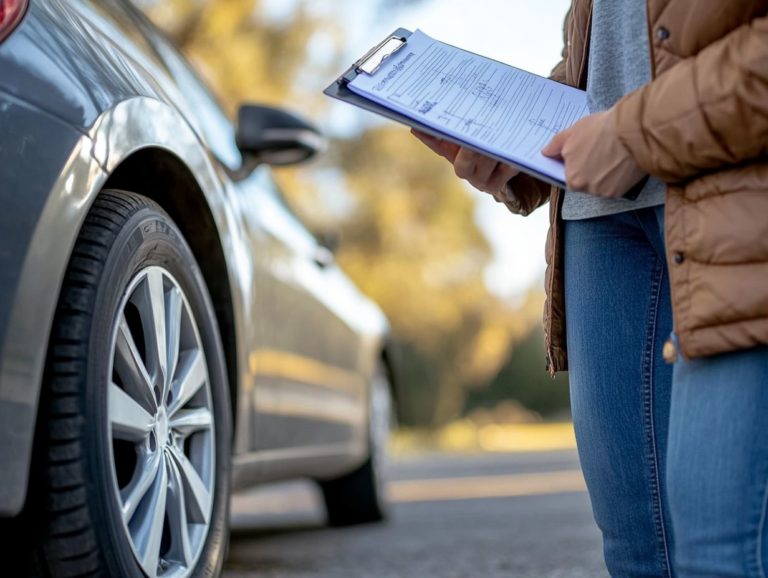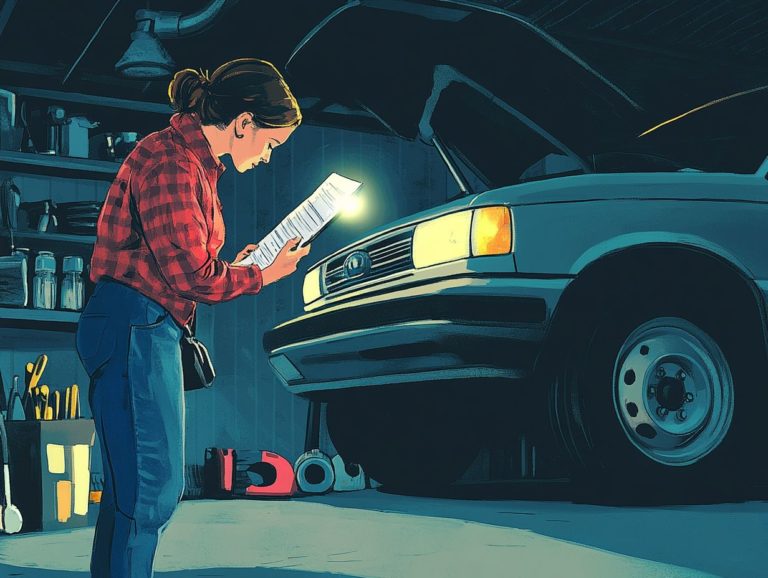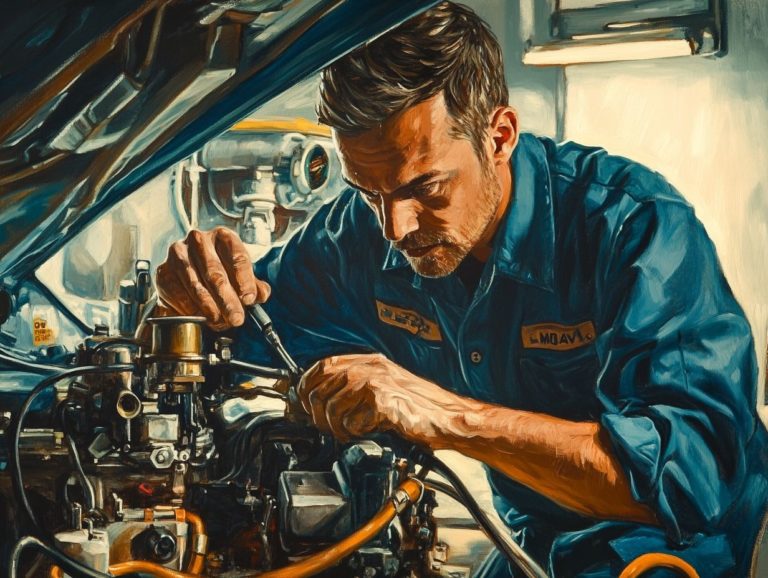The Role of Technology in Car Inspections
Car inspections are vital for vehicle maintenance. They ensure safety and optimal performance on the road.
Technology has transformed the methods used for these inspections.
This article explores the shift from traditional techniques to technology-driven inspections.
You will discover the benefits of this evolution, various tools used, and the challenges faced.
Join us to envision the future of car inspections and how emerging innovations will influence the industry.
Contents
- Key Takeaways:
- The Evolution of Car Inspections
- Benefits of Technology in Car Inspections
- Types of Technology Used in Car Inspections
- Challenges and Limitations of Technology in Car Inspections
- The Future of Car Inspections
- Frequently Asked Questions
- What is the role of technology in car inspections?
- What types of technology are used in car inspections?
- How does technology help streamline the car inspection process?
- Can technology improve the accuracy of car inspections?
- What are the benefits of using technology in car inspections?
- Is technology replacing human inspectors in car inspections?
Key Takeaways:
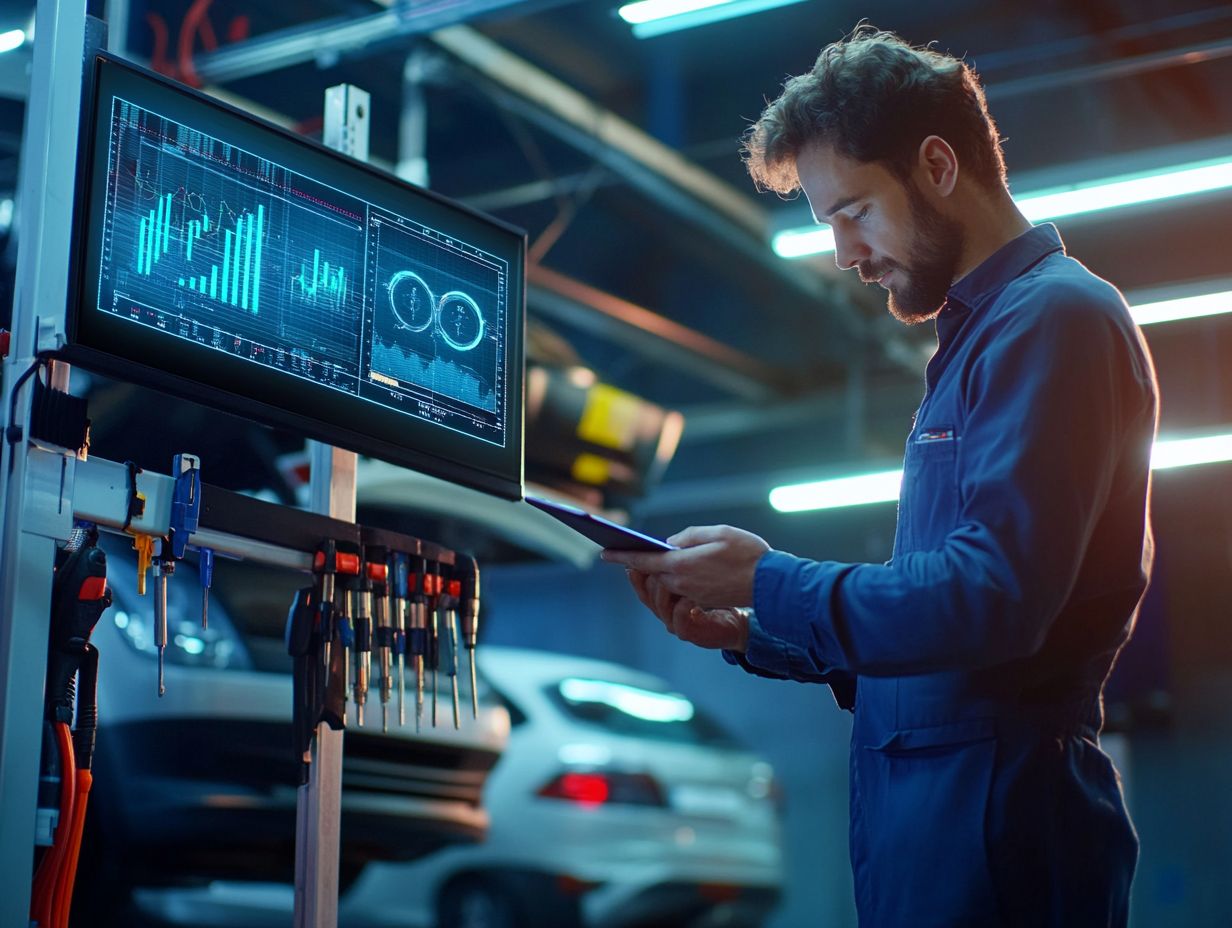
Technology has greatly improved car inspections, making them more efficient and accurate.
Diagnostic tools and remote inspections have led to significant cost savings for inspectors and car owners.
Despite challenges, the future of car inspections looks promising with ongoing technological advancements.
Why Are Car Inspections Important?
Car inspections ensure your vehicle’s health and safety. They help identify potential issues before they become expensive repairs.
Regular inspections boost your satisfaction and help maintain compliance with safety standards. This significantly reduces the risk of accidents caused by vehicle malfunctions.
By evaluating critical components like brakes and tires, inspections prolong your vehicle’s life and enhance performance.
This proactive approach keeps you informed about your vehicle’s condition, fostering trust in repair processes.
Safety regulations contribute to public safety, benefiting everyone.
Feeling secure in your vehicle strengthens your loyalty to automotive services. This creates a cycle where well-maintained cars lead to fewer road incidents and greater satisfaction.
The Evolution of Car Inspections
The evolution of car inspections marks a significant shift in the automotive industry. We are moving away from traditional methods that relied heavily on human judgment.
Advanced technologies now harness artificial intelligence and machine learning to improve inspection accuracy and efficiency.
Traditional Methods vs. Technology-Based Inspections
Traditional inspections often relied on manual evaluations, leaving room for human error. In contrast, technology-based inspections use automated systems for greater precision.
These modern techniques streamline evaluations and utilize advanced algorithms to quickly analyze data. Unlike labor-intensive methods, technology-based inspections enable real-time data collection and analysis.
Automated systems with advanced sensors detect discrepancies that may escape the human eye. This innovation enhances quality control and ensures vehicles meet strict safety standards.
Benefits of Technology in Car Inspections
Integrating technology in car inspections offers many advantages.
You’ll enjoy heightened operational efficiency, leading to quicker processes. The accuracy of damage detection also significantly improves.
This advancement enhances customer satisfaction by providing transparent service histories and comprehensive inspection reports that build trust.
Efficiency and Accuracy
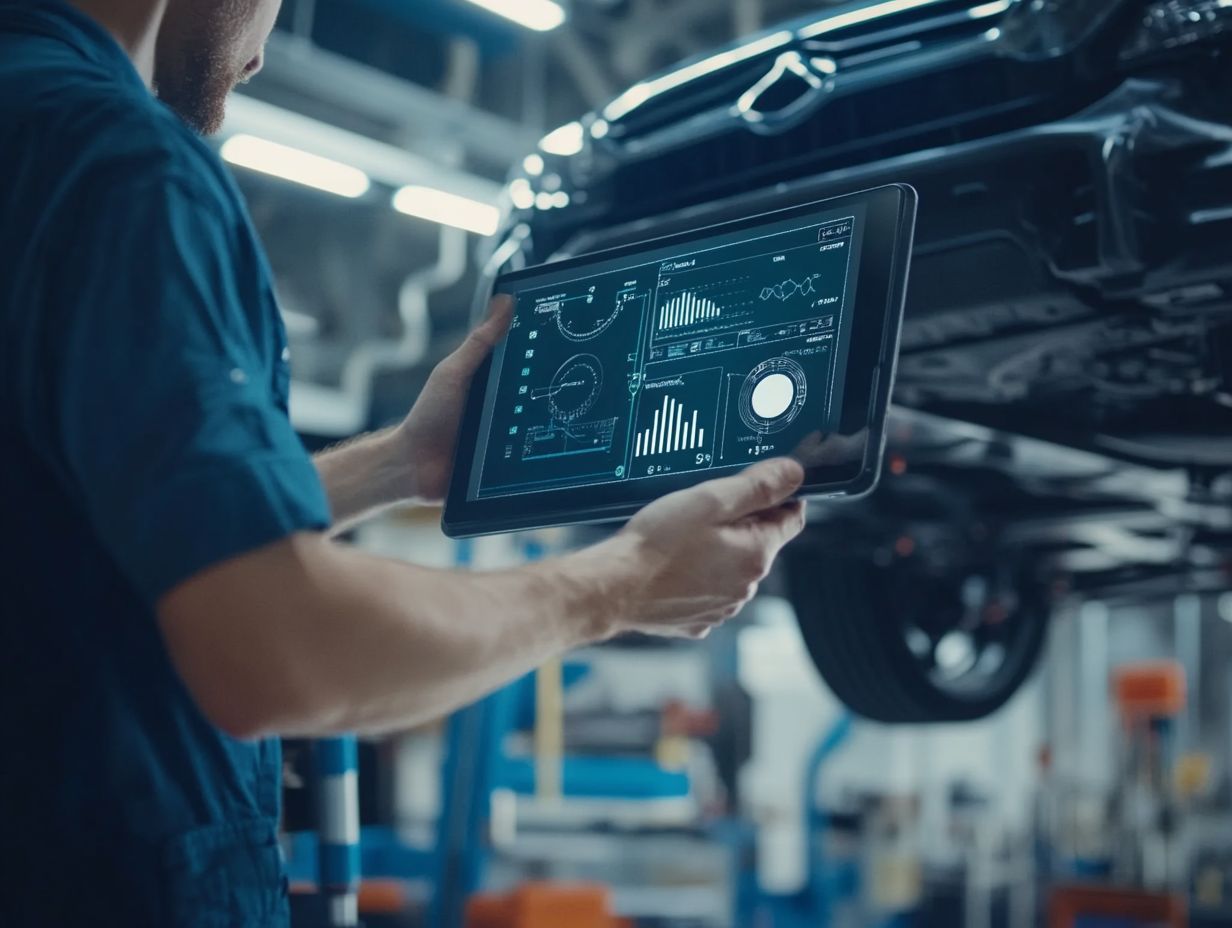
Efficiency and accuracy are crucial in your inspection process. Digital vehicle inspection technologies harness machine learning and computer vision to analyze vehicle components swiftly and precisely.
By embracing these advanced methodologies, you can significantly cut down the time spent on assessments while enhancing the reliability of your findings. Tools equipped with machine learning algorithms can recognize patterns and anomalies in the vehicle’s data, paving the way for predictive maintenance and timely repairs.
Computer vision technologies elevate the examination of hard-to-reach areas, capturing high-resolution images that provide unparalleled detail. This integration minimizes human error and strengthens compliance with safety regulations.
As a result, your entire inspection workflow becomes more streamlined, ensuring a thorough yet efficient evaluation process that benefits both service providers and vehicle owners alike.
Cost Savings
Implementing technology in car inspections can lead to significant cost savings for you, whether you re running a service center or simply a vehicle owner. This approach not only promotes predictive maintenance but also reduces the likelihood of unexpected repairs.
By embracing advanced diagnostic tools and data analytics, you can identify potential issues before they escalate into costly breakdowns. This proactive strategy allows for customized maintenance schedules that cater specifically to your vehicle’s needs.
Integrating IoT devices enables real-time monitoring, which streamlines the inspection process and optimizes resource allocation in service centers. This also lowers operational costs in the automotive industry, creating a more economical ecosystem that benefits you as a consumer while driving innovation forward.
Types of Technology Used in Car Inspections
A range of advanced technologies has emerged to elevate vehicle inspections, including sophisticated diagnostic tools, IoT sensor technology, and automated systems that enable thorough evaluations of vehicle conditions.
Diagnostic Tools
Diagnostic tools harness the power of machine learning algorithms to evaluate vehicle components, offering you invaluable insights during digital vehicle inspections and enhancing the precision of damage detection.
These tools analyze a lot of data from your vehicle s sensors, pinpointing anomalies that may signal underlying issues. By utilizing these sophisticated algorithms, you gain a deeper understanding and more accurate evaluations that traditional methods often struggle to provide.
The integration of machine learning streamlines the inspection process and boosts reliability, giving you the power to make informed decisions about maintenance. This technology encourages a proactive approach to vehicle care, which can help reduce repair costs and enhance overall safety on the road.
Remote Inspections
Remote inspections give you the power to evaluate vehicle conditions from afar, seamlessly blending convenience with efficiency in the inspection process.
This exciting approach uses advanced technologies like video conferencing, augmented reality, and real-time data sharing, allowing for comprehensive assessments without the need for physical presence.
With user-friendly mobile applications, technicians can expertly guide you through essential procedures, ensuring that every detail is meticulously captured.
The benefits are plentiful; not only does this method save you time and alleviate the logistical hurdles of coordinating on-site evaluations, but it also elevates customer satisfaction by providing swift solutions.
As companies increasingly embrace these modern inspection techniques, the industry is undergoing a remarkable transformation towards remote capabilities that streamline operations while upholding exceptional service standards.
Challenges and Limitations of Technology in Car Inspections
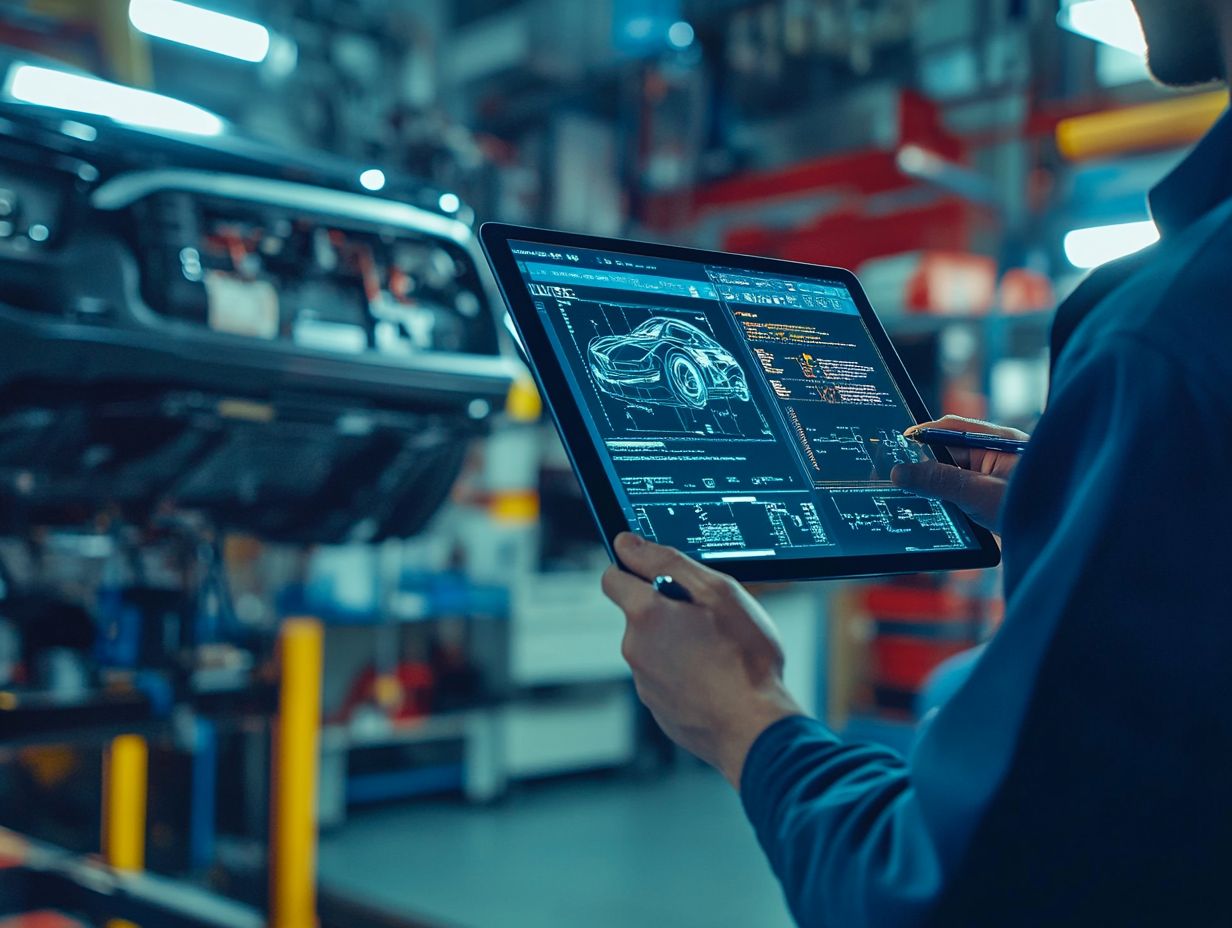
The adoption of technology in vehicle inspections offers numerous benefits, yet it also brings forth challenges and limitations.
You may encounter potential errors stemming from malfunctioning systems, as well as privacy concerns surrounding sensitive vehicle data.
Potential Errors and Malfunctions
Errors and malfunctions in automated systems can lead to misinterpreted inspection data. This compromises the accuracy of vehicle assessments and introduces serious risks to safety standards.
These issues come from software glitches, sensor errors, and operator mistakes. For instance, if a camera malfunctions, it may misread critical components like brakes or tires, allowing a vehicle to pass inspection when it shouldn t.
Outdated algorithms might miss new vehicle technologies, resulting in incorrect evaluations. These malfunctions undermine the reliability of inspections and create a false sense of security among vehicle owners, ultimately putting road safety at risk.
Privacy Concerns
During vehicle inspections, privacy concerns inevitably arise as sensitive data is collected and analyzed. It s crucial to implement measures to ensure customer satisfaction and protect that data.
These concerns highlight the need for stringent data protection protocols. Today s consumers increasingly demand transparency and accountability from service providers. By safeguarding personal information, you build trust and enhance the overall customer experience.
To achieve this balance, inspectors should use advanced encryption methods and follow regulations governing data usage. This keeps customers secure throughout the inspection process.
By prioritizing privacy, companies can establish strong relationships with clients, fostering loyalty and satisfaction in an industry where trust is essential.
The Future of Car Inspections
Wondering how technology is changing car inspections? The future is set for a remarkable transformation driven by cutting-edge technology. Imagine using AI insights and smart systems to enable proactive maintenance.
This evolution will redefine vehicle care, enhancing efficiency and reliability like never before.
Advancements in Technology and Potential Impact
Advancements, including smart solutions and predictive maintenance systems, are poised to revolutionize vehicle inspections. They improve accuracy, enhance operational efficiency, and reduce overall vehicle ownership costs.
These innovations pave the way for streamlined processes and data-driven decision-making in the inspection industry. By integrating artificial intelligence, you can analyze vast amounts of vehicle data to spot potential issues before they escalate.
With mobile apps and connected devices, inspectors receive real-time updates, ensuring they have the most accurate information on hand. Sensor technology continuously monitors vehicle performance, helping technicians identify areas needing attention. This fosters a proactive approach to maintenance.
As these technologies evolve, they promise to make vehicle inspections faster and more reliable, ultimately enhancing safety on the roads for everyone.
Frequently Asked Questions
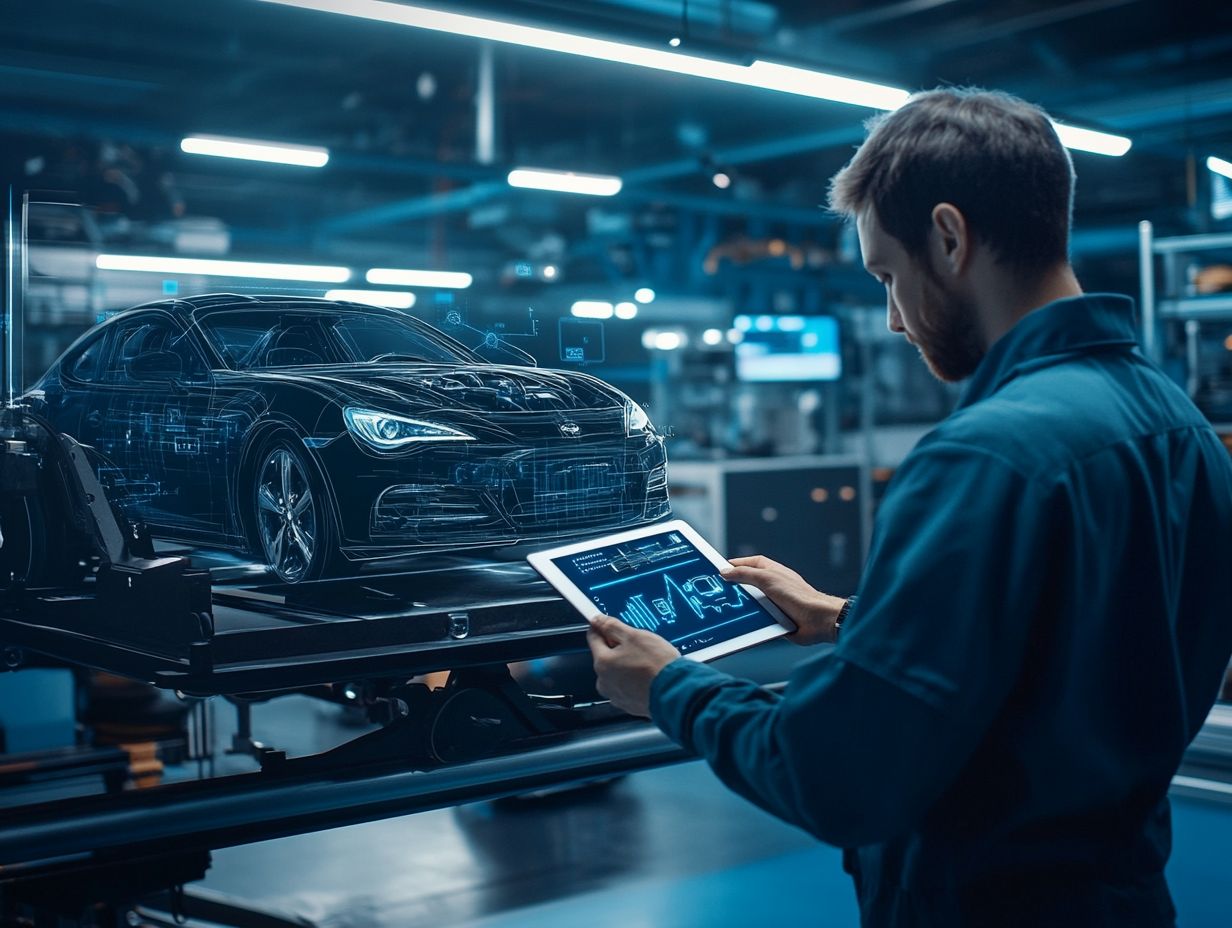
What is the role of technology in car inspections?
Technology improves the accuracy, efficiency, and overall quality of vehicle inspections. It facilitates precise assessments of a car’s condition, identifies potential safety hazards, and highlights the role of a mechanic in car inspections to ensure compliance with regulations.
What types of technology are used in car inspections?
Various types of technology are used, including diagnostic tools, computerized scanners, and remote cameras. These tools help inspectors evaluate a car’s performance, safety features, and structural integrity.
How does technology help streamline the car inspection process?
Technology streamlines the inspection process by automating tasks and providing real-time data analysis. This reduces the time and effort required for inspections, enabling quicker and more efficient evaluations.
Ready to learn more about the inspection process or schedule your own inspection? Contact us today!
Can technology improve the accuracy of car inspections?
Yes, technology can greatly improve the accuracy of car inspections. Advanced diagnostic tools and computerized systems help inspectors spot even small issues, making it vital to understand the car inspection process.
This leads to more reliable and thorough checks.
What are the benefits of using technology in car inspections?
Technology boosts accuracy, safety, and efficiency while lowering maintenance costs.
It allows for quick identification of potential problems, ensuring vehicle safety on the road.
Is technology replacing human inspectors in car inspections?
Technology does not replace human inspectors in car inspections. While it greatly assists the inspection process, human oversight is key for thorough evaluations.
Technology enhances the abilities of inspectors and makes the process more efficient.
Embrace technology to elevate car inspections and ensure safer roads for everyone!



